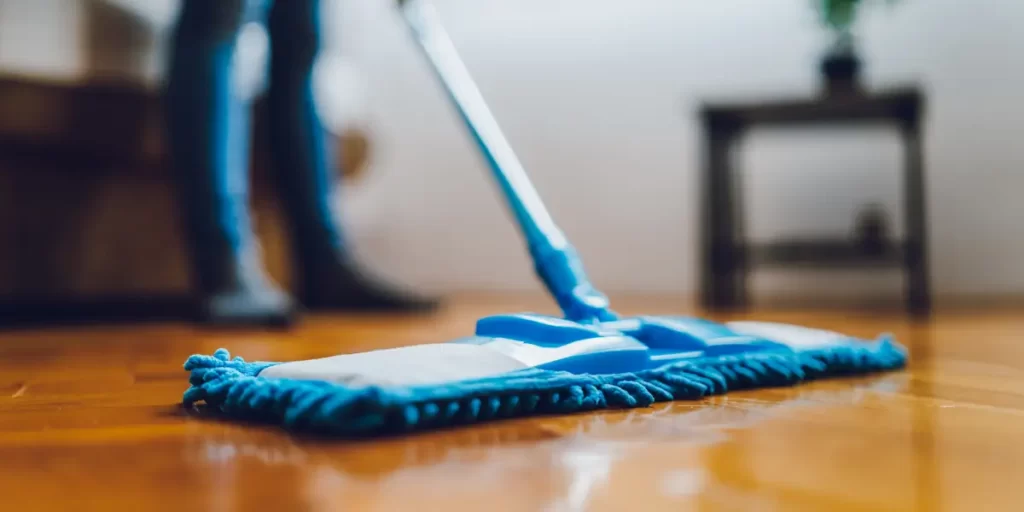Last Updated on August 6, 2023 By Emma W. Thomas
Yes, a landlord can tell tenants how clean to keep the house. A landlord can set cleanliness standards in the lease agreement, ensuring the property’s upkeep. However, tenants have the right to privacy and reasonable control over their living space.
Can A Landlord Tell You How Clean To Keep Your House?
When it comes to renting a home, both landlords and tenants have certain rights and responsibilities. While landlords are responsible for maintaining the property, tenants are expected to keep it in a clean and habitable condition. However, there may be instances where landlords try to impose specific cleaning standards on their tenants. In this listicle, we will explore whether or not a landlord can tell you how clean to keep your house.
- Lease Agreements:
In most rental agreements, there are clauses outlining the responsibilities of both parties when it comes to maintaining the property. While landlords can ask for general cleanliness, they cannot dictate excessively detailed cleaning requirements. Typically, agreements only require tenants to maintain a reasonable level of cleanliness. - Health and Safety Standards:
Landlords have the right to ensure that the property is safe and habitable for tenants. This means they can request compliance with health and safety regulations, such as proper cleaning and disposal of garbage. However, landlords cannot dictate specific cleaning routines or micro-manage tenants’ cleaning habits, as long as the property remains in a reasonable and clean condition. - Wear and Tear vs. Damage:
It’s essential to understand the difference between wear and tear and actual damage. Landlords cannot hold tenants responsible for normal wear and tear resulting from regular usage. However, if a tenant’s cleaning practices lead to excessive damage, such as staining carpets or neglecting to clean up spills that cause permanent damage, the landlord can hold them accountable for the necessary repairs or deductions from the security deposit. - Local and State Laws:
Local and state laws can vary, so it is essential to check relevant regulations in your area. Some jurisdictions may have specific cleanliness requirements, especially regarding rental properties, to ensure the property meets certain health and safety standards. However, such regulations usually focus on critical areas like sanitation, pest control, mold prevention, and maintaining essential utilities. - Open Communication:
Ideally, landlords and tenants should maintain open lines of communication to resolve any issues related to cleanliness or maintenance. It is recommended to document all agreements and requests in writing, ensuring clarity for both parties. Tenants should promptly notify the landlord of any concerns or issues, while landlords should address legitimate concerns in a timely manner.
What Is Considered As A Mess Or Dirt In A Rented Apartment?

Sometimes, the lease agreement is not very clear on the type of mess that can get you evicted. We broke it down for you to make it easier to understand. When you rent an apartment, the management or landlord expects you to leave it in the same condition you found it. This means that they shouldn’t incur huge costs for repairing and cleaning the house if you move out. Keeping your house dirty devalues it and makes it unpleasant to other tenants in the future, and that’s why your landlord has the right to inspect and tell you to clean.
Some indicators of a dirty house that can make your landlord tell you to clean or evict you are:
- Clutter that sits in your house collecting dust
- Mold on bathroom walls
- Overstayed garbage that has been over a week or garbage kept in the wrong place such as staircases and fire exits
- Rodents and pest infestation from an accumulation of waste
- Blocked sewer system or plumbing fixtures as a result of waste material
- Grease and soot on sidewalls as a result of the wrong use of cooking equipment
- Denying access to extermination
- Unpleasant smell coming from the house
- Toxic, flammable, or explosive chemicals lying around
If you stay in a rented space with any of these conditions, then your landlord has a right to tell you to clean up. If you don’t improve, your landlord can evict you rightfully.
How To Keep Your House Clean
A clean house not only abides by the lease agreement to keep you from being evicted, but it also promotes your mental well-being and improves the quality of living. Keeping your house clean isn’t an easy chore; it is demanding and time-consuming, and you need to be intentional about keeping a clean home.
We consulted a cleaning expert in a bid to find the easiest way of keeping your house clean. Here are some tips that will ensure your home is always clean.
1. Plan Your Cleaning Chores In Advance
Planning out your duties will help you get things done without feeling overwhelmed. For easy planning, write down the chores you have to do, and the time you have. Allocate each task to a specific and reasonable timeline.
2. Clean As You Go
This basic habit will help save you a lot of clutter and chores. When cooking, ensure you clean the dishes in the sink and wipe down surfaces. Put away trash immediately to avoid having lots of dirt lying in the house. Putting away stuff after you’re done using is a great way to keep your home tidy all the time.
3. Get Everyone Involved In Cleaning Tasks
If you live together with family or friends, ensure everyone has an assigned cleaning chore. This will help in keeping the house clean and spending the least possible time cleaning. Sharing chores makes them fun and quick to accomplish.
4. Embrace Machines That Make Work Easier
Investing in a good vacuum cleaner, washing machine, and dishwasher will save you lots of time and effort. These machines reduce the time taken to do chores and also clean more efficiently. With smart gadgets that you can control using your phone, you don’t need to be home for cleaning to take place.
5. Ensure Everything Has A Designated Storage Area
A great secret to keeping your home looking clean and tidy all the time is ensuring everything has a designated storage space. This helps to ensure you return things where you found them when you finish using them. It will also help to keep spaces free from clutter.
6. Declutter Your Home
Clutter makes your home look dirty, harbors dust, and makes it hard to clean. Get rid of things you no longer need to ensure you have a functional home that’s easy to clean. Clutter is a valid reason for your landlord to give you a notice or evict you. Clutter can be a fire hazard or attract vermin and odor to a house which are all valid reasons for your landlord to terminate your tenancy.
How To Deal With A Messy Tenant
Are you a landlord who’s stressed by having a messy tenant? In this section, we take you through how to cope with the sticky situation and how to avoid such in the future.
If your tenant is messy, you have the right to give them the notice to clean, then evict them if they don’t improve. For some tenants, they are more of hoarders which makes your apartment appear messy all the time. It would be best if you were careful when dealing with such since hoarding is considered a mental disorder by the American psychiatrist association. The federal housing authority protects hoarders, and you need to follow legal procedures.
When dealing with a hoarder, try to be as empathetic and understanding as you possibly can. You can go through a court process to evict them legally, but if their hoarding doesn’t cause fire hazards or damage to your property, learn to cope with them.
How Do I Get Tenants To Clean Regularly?

As a landlord, getting your tenants to keep your property clean is no mean fit. You need to ensure that tenants keep your house clean to reduce the costs of turning over the house after they move out. So how do you ensure tenants clean your property regularly? Here’s how:
Have A Cleanliness Clause In The Lease
A cleanliness clause in your lease agreement will help you reduce the chances of a messy tenant moving in. In this clause, ensure you state explicitly what you expect of the tenant, including cleaning routines. Include a moving-out cleanliness checklist in the agreement. This checklist should be given to the tenant a month before they move out. A cleaning checklist is effective in motivating tenants to clean since they want to get back their security deposit.
Here’s what to include in the cleanliness clause:
- The state in which the tenant should leave the house when moving out. In most cases, tenants will be required to leave the house in the same state or better than they found it.
- When the trash needs to go out and acceptable disposal sites and their locations
- All the areas of the house that you expect the client to clean
- What to do in case of pests, mold, or mildew
- Inspection rules and procedures
When coming up with a cleanliness clause, ensure you read your local laws to ensure your requirements are acceptable. Different states have different restrictions on what can be included in the lease.
Inspect Your Property Regularly
Inspecting your premises quarterly will help you notice any mess or deterioration and your tenant will know that you have a constant presence around your property. It would help if you had a clause in your lease regarding your right of entry for inspection. You are required to give your tenant at least 24-hour notice before entering the premise at the agreed-upon time. When your tenants know that you’re likely to tour the premises a few times a year, they will make an effort to keep the place in decent shape.
Wrapping up
A clean house is great to live in as a tenant and is also every landlord’s desire. If a home gets messy, the law allows the landlord to give you a notice or evict you. How clean your house should be is not clear by law. However, your lease agreement should state clearly how clean you should keep your house. As a tenant, always ensure you read all clauses of the lease and agree to them before signing it. As a landlord, ensure your expectations for cleanliness are reasonable and are explicitly stated in the lease agreement. No matter which side of the tenant-landlord debate you are in, ensure you do your part to keep the house clean and habitable. Also, be in a working relationship with your tenant or landlord to agree on arising matters such as a pest infestation as a result of climate change. We hope that this post has helped you understand your responsibilities as a tenant or landlord.
References:
https://homeia.com/home-maintenance/can-a-landlord-tell-you-how-clean-to-keep-your-home/
https://www.housereal.net/can-a-landlord-tell-you-how-clean-to-keep-your-house/
Emma is a graduate of Domestic Science or Family and Consumer Sciences (Home Economics) from the University of Wisconsin. She has 7 years of experience Working with the strategic section of BestBuy and now writing full-time for Homeeon.
From Managing the Home, Interiors, Cleaning, and Exteriors to Gardening and everything about Making A Home Liveable – is her passion and this Homeeon is the result of this.
Emma loves decorating her home with the best stuff found online. She cares about quality over anything and writes reviews about them here in Homeeon. Get in touch with her over Pinterest.
Keep reading her blogs.

